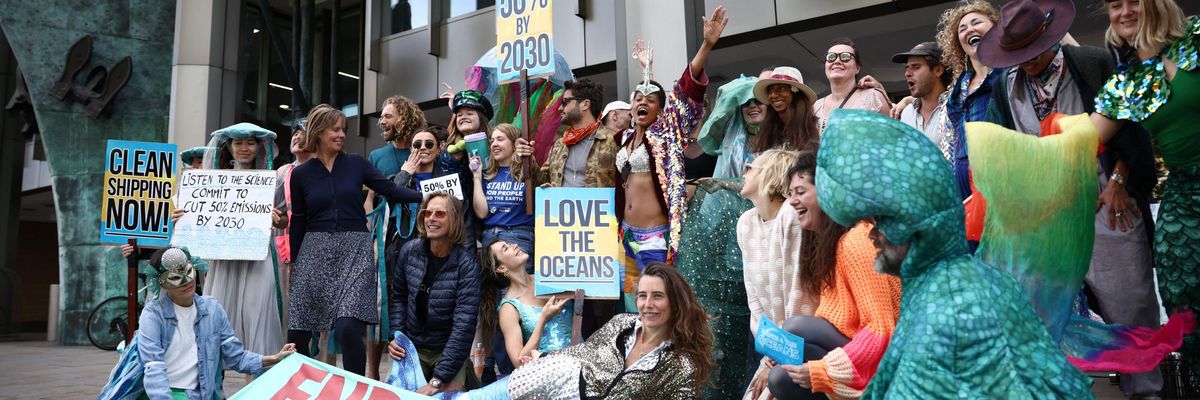As the world's seafaring nations failed to agree on any absolute emission reduction targets during this week's Marine Environment Protection Committee meeting in London, civil society groups warned Friday that the draft deal reached by 175 nations is insufficient to achieve the Paris climate agreement's preferred 1.5°C planetary warming limit.
In a tentative agreement reached at the tail end of the 80th Marine Environment Protection Committee meeting (MEPC80), members of the United Nations' International Maritime Organization (IMO) eschewed concrete commitments to slash greenhouse gas emissions in favor of "indicative checkpoints" to reach net-zero by or around 2050.
These include reducing global annual emissions from shipping from 2008 levels "by at least 20% and striving for 30% by 2030." In the longer term, the tentative agreement calls for a 70% reduction—and "striving for 80%"—in shipping emissions by 2040.
Activists are demanding a 50% reduction in worldwide shipping emissions from 2008 levels by the end of the decade.
The shipping industry is responsible for about 3% of total global greenhouse gas emissions, even more than worldwide commercial aviation. The overwhelming majority of the roughly 100,000 cargo vessels plying the seas and carrying 90% of all global cargo run on bunker fuel, the world's dirtiest diesel containing 3,500 times more sulfur than automotive diesel.
Members of Ocean Rebellion marked what the activist group called the "total failure" of MEPC80 by dropping a large banner from the second floor of IMO Lambeth Road headquarters.
Ocean Rebellion also staged creative protests throughout the week at MEPC80. An activist dressed as Poseidon confronted attendees; the mythical ruler of the seas also "sent a letter" to IMO Secretary-General Kitack Lim seeking a meeting to discuss how his "watery realm is becoming uninhabitable."
Ocean Rebellion also staged a mermaid "die-in" on the conference floor, and threw a morning rave outside the IMO building.
"The U.N. talks a great talk. The International Maritime Organization, a U.N. body, is unfit for purpose. It's corrupted by industry and uses its U.N. remit on behalf of the shipping industry," charged Ocean Rebellion activist and artist Suzanne Stallard.
"We're living in an age of ecological breakdown; the U.N. must recognize this by reforming IMO governance," she added. "We ask the U.N. to call out its rogue subsidiaries, still more harmful to life on Earth than the rogue states we hear so much about."
The Clean Shipping Coalition, an international association of civil society environmental protection groups, on Friday published a set of recommendations for the shipping industry:
- 1.5°C-aligned emission cuts through the introduction of new legislation and tightening of existing laws;
- Shipping levies on a 1.5°C-aligned basis and of at least $100 per ton of greenhouse gas emissions in service of an equitable transition;
- Industry cooperation and investments in wind propulsion, green hydrogen, and other alternative energy solutions;
- Inclusion of shipping in countries' nationally determined contributions under the Paris agreement.
"There is no excuse for this wish-and-a-prayer agreement," John Maggs, president of the Clean Shipping Coalition, said in a statement. "They knew what the science required, and that a 50% cut in emissions by 2030 was both possible and affordable. Instead, the level of ambition agreed is far short of what is needed to be sure of keeping global heating below 1.5ºC and the language seemingly contrived to be vague and noncommittal."
"The most vulnerable put up an admirable fight for high ambition and significantly improved the agreement," Maggs added, "but we are still a long way from the IMO treating the climate crisis with the urgency that it deserves and that the public demands."

